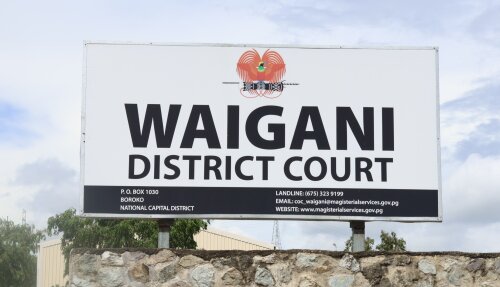Best Natural Resources Lawyers in Papua New Guinea
Share your needs with us, get contacted by law firms.
Free. Takes 2 min.
Or refine your search by selecting a city:
List of the best lawyers in Papua New Guinea
About Natural Resources Law in Papua New Guinea
Papua New Guinea (PNG) is endowed with an abundance of natural resources, including minerals, oil, gas, forests, and fisheries. These resources play a vital role in the country's economy and development. Natural Resources Law in PNG governs the extraction, management, and conservation of these resources, seeking to balance exploitation with environmental protection and the rights of local communities. These laws aim to ensure that natural resources are used sustainably, benefit the local population, and comply with international standards.
Why You May Need a Lawyer
Legal advice can be crucial in various situations related to natural resources in Papua New Guinea. Some common scenarios where legal help may be necessary include:
- Obtaining permits and licenses for resource extraction.
- Negotiating landowner agreements and benefit-sharing arrangements.
- Resolving disputes over land rights or environmental impact.
- Ensuring compliance with environmental regulations and conservation laws.
- Navigating joint ventures and partnerships with foreign companies.
- Challenging or defending against government decisions or actions.
- Advising on tax implications for resource-related activities.
Local Laws Overview
Papua New Guinea's legal system incorporates customary law, statutes, and common law principles. Key aspects of the legal framework for natural resources include:
- Mining Act: Regulates mining activities, including exploration, extraction, and export of minerals. It defines the roles of the government and landowners.
- Oil and Gas Act: Governs petroleum exploration and mining, emphasizing environmental protection and local benefits.
- Forestry Act: Controls forest management and logging operations, with an emphasis on sustainable practices.
- Conservation and Environment Protection Act: Provides guidelines for environmental impact assessments and conservation measures.
- Land Act: Addresses land ownership and usage rights, crucial in resource extraction where land is traditionally owned by local communities.
Frequently Asked Questions
What is the role of landowners in resource extraction projects?
Landowners have significant rights and roles, often including negotiation of compensation and benefits agreements, especially since much of PNG's land is held under customary ownership.
How are environmental impacts assessed and managed in PNG?
Environmental impact assessments are mandatory for major projects, and management plans are developed to mitigate adverse effects under the Conservation and Environment Protection Act.
Are there special provisions for indigenous peoples in resource laws?
Yes, PNG law recognizes the rights of indigenous communities, emphasizing benefit-sharing and participation in decisions affecting their land and resources.
What permits are required for mining operations in PNG?
Companies must obtain several permits, including exploration licenses, mining leases, and environmental permits, each with specific requirements and government oversight.
How is resource revenue shared in PNG?
Revenue sharing is outlined in agreements between the government, companies, and landowners, with specific percentages often negotiated to include local communities.
What is the process for resolving land disputes related to natural resources?
Disputes can be resolved through mediation, customary methods, or formal legal processes, depending on the nature and complexity of the issue.
Can foreign companies participate in PNG's resource sector?
Yes, foreign investment is encouraged, but companies must adhere to local laws, partner with local entities, and often involve landowner agreements.
What protections exist for the environment during resource extraction?
Regulations require impact assessments, adherence to environmental management plans, and continual monitoring to mitigate negative effects on the ecosystem.
Is there a regulatory body overseeing natural resources in PNG?
Yes, various government agencies oversee different sectors, such as the Department of Mineral Policy & Geohazards Management and the Department of Environment & Conservation.
How are taxes applied to resource extraction in PNG?
Taxes include royalties, production levies, and income taxes, structured to ensure that the state and communities benefit financially from resource extraction.
Additional Resources
Several resources and organizations can provide valuable information and assistance:
- Department of Mineral Policy & Geohazards Management
- Conservation and Environment Protection Authority
- PNG Chamber of Mines and Petroleum
- PNG National Forest Authority
- Local legal aid organizations with expertise in natural resources.
Next Steps
If you need legal assistance related to natural resources in Papua New Guinea, consider taking the following steps:
- Consult with a lawyer who specializes in natural resources law.
- Engage with local community groups for support and information.
- Research relevant government agencies for guidance on legal requirements.
- Review existing agreements and permits to ensure compliance.
- Initiate dialogue with stakeholders for possible negotiation or mediation.
Lawzana helps you find the best lawyers and law firms in Papua New Guinea through a curated and pre-screened list of qualified legal professionals. Our platform offers rankings and detailed profiles of attorneys and law firms, allowing you to compare based on practice areas, including Natural Resources, experience, and client feedback.
Each profile includes a description of the firm's areas of practice, client reviews, team members and partners, year of establishment, spoken languages, office locations, contact information, social media presence, and any published articles or resources. Most firms on our platform speak English and are experienced in both local and international legal matters.
Get a quote from top-rated law firms in Papua New Guinea — quickly, securely, and without unnecessary hassle.
Disclaimer:
The information provided on this page is for general informational purposes only and does not constitute legal advice. While we strive to ensure the accuracy and relevance of the content, legal information may change over time, and interpretations of the law can vary. You should always consult with a qualified legal professional for advice specific to your situation.
We disclaim all liability for actions taken or not taken based on the content of this page. If you believe any information is incorrect or outdated, please contact us, and we will review and update it where appropriate.
Browse natural resources law firms by city in Papua New Guinea
Refine your search by selecting a city.














